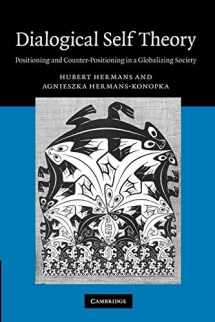
Dialogical Self Theory: Positioning and Counter-Positioning in a Globalizing Society
ISBN-13:
9781107411746
ISBN-10:
1107411742
Edition:
Reprint
Author:
Hubert Hermans, Agnieszka Hermans-Konopka
Publication date:
2012
Publisher:
Cambridge University Press
Format:
Paperback
404 pages
FREE US shipping
Rent
35 days
Due Jun 21, 2024
35 days
from $22.49
USD
Book details
ISBN-13:
9781107411746
ISBN-10:
1107411742
Edition:
Reprint
Author:
Hubert Hermans, Agnieszka Hermans-Konopka
Publication date:
2012
Publisher:
Cambridge University Press
Format:
Paperback
404 pages
Summary
Dialogical Self Theory: Positioning and Counter-Positioning in a Globalizing Society (ISBN-13: 9781107411746 and ISBN-10: 1107411742), written by authors
Hubert Hermans, Agnieszka Hermans-Konopka, was published by Cambridge University Press in 2012.
With an overall rating of 3.7 stars, it's a notable title among other
Social Psychology & Interactions
(Psychology & Counseling, Social Psychology & Interactions, Psychology, Sociology) books. You can easily purchase or rent Dialogical Self Theory: Positioning and Counter-Positioning in a Globalizing Society (Paperback, Used) from BooksRun,
along with many other new and used
Social Psychology & Interactions
books
and textbooks.
And, if you're looking to sell your copy, our current buyback offer is $1.15.
Description
In a boundary-crossing and globalizing world, the personal and social positions in self and identity become increasingly dense, heterogeneous and even conflicting. In this handbook scholars of different disciplines, nations and cultures (East and West) bring together their views and applications of dialogical self theory in such a way that deeper commonalities are brought to the surface. As a 'bridging theory', dialogical self theory reveals unexpected links between a broad variety of phenomena, such as self and identity problems in education and psychotherapy, multicultural identities, child-rearing practices, adult development, consumer behaviour, the use of the internet and the value of silence. Researchers and practitioners present different methods of investigation, both qualitative and quantitative, and also highlight applications of dialogical self theory.


We would LOVE it if you could help us and other readers by reviewing the book
Book review

Congratulations! We have received your book review.
{user}
{createdAt}
by {truncated_author}


